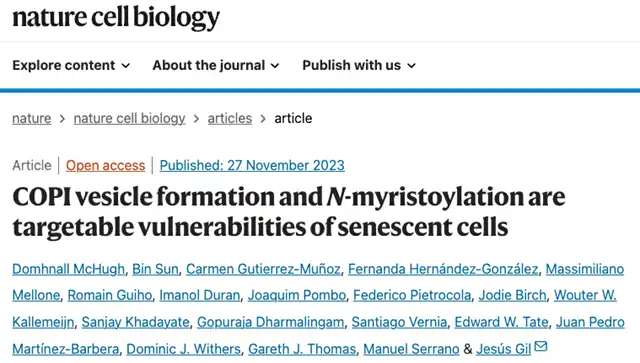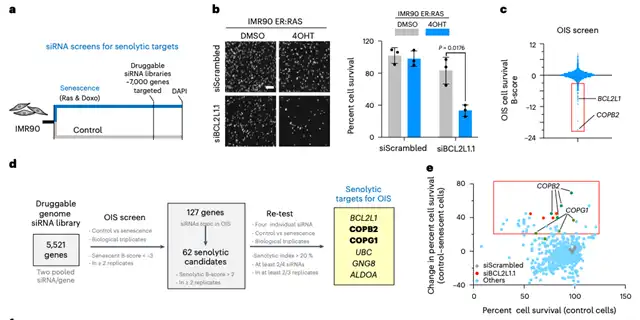Discovery of New Targets for Treating Cancer and Age-Related Diseases
- Normal Liver Cells Found to Promote Cancer Metastasis to the Liver
- Nearly 80% Complete Remission: Breakthrough in ADC Anti-Tumor Treatment
- Vaccination Against Common Diseases May Prevent Dementia!
- New Alzheimer’s Disease (AD) Diagnosis and Staging Criteria
- Breakthrough in Alzheimer’s Disease: New Nasal Spray Halts Cognitive Decline by Targeting Toxic Protein
- Can the Tap Water at the Paris Olympics be Drunk Directly?
Breakthrough in Anti-Aging Research: Discovery of New Targets for Treating Cancer and Age-Related Diseases
- Should China be held legally responsible for the US’s $18 trillion COVID losses?
- CT Radiation Exposure Linked to Blood Cancer in Children and Adolescents
- FDA has mandated a top-level black box warning for all marketed CAR-T therapies
- Can people with high blood pressure eat peanuts?
- What is the difference between dopamine and dobutamine?
- How long can the patient live after heart stent surgery?
Breakthrough in Anti-Aging Research: Discovery of New Targets for Treating Cancer and Age-Related Diseases
Aging is a cellular response induced by stress factors such as replication exhaustion, carcinogenic activation, or genotoxic drugs. Following aging induction, cells enter a stable cell cycle arrest state, mediated by the upregulation of cell cycle protein-dependent kinases inhibitors, such as p16INK4a and p21CIP1. Aging cells also undergo various phenotypic changes, including morphological alterations, chromatin remodeling, organelle reorganization, metabolic changes, and the production of a biologically active secretion profile known as senescence-associated secretory phenotype (SASP).
Acute aging induction is a protective response that limits the replication of damaged cells to restrict cancer and fibrosis. However, the accumulation of aging cells during the aging process can lead to various pathological conditions. Selectively eliminating p16INK4a-positive aging cells in normal elderly mice has been shown to improve health, extend lifespan, and alleviate pathologies such as atherosclerosis, osteoarthritis, and neurodegenerative diseases. These findings have laid the foundation for aging treatment.
Recently, researchers from Imperial College London published a study titled “COPI vesicle formation and N-myristoylation are targetable vulnerabilities of senescent cells” in the journal Nature Cell Biology.
The study, conducted through RNA interference screening, identified a senolytic target pathway called Coat Protein Complex I (COPI). Targeting and inhibiting this pathway were found to induce the death of aging cells, thereby improving the outcomes in mouse models of cancer and fibrosis. The research further revealed that a class of drugs indirectly inhibiting the COPI pathway, known as N-myristoyltransferase inhibitors (NMTi), could serve as candidate drugs for killing aging cells and treating age-related diseases such as cancer and fibrosis.

This research has uncovered previously unknown vulnerabilities of aging cells, opening new possibilities for the treatment of cancer, fibrosis, and other age-related diseases.
Several senolytics, which selectively eliminate aging cells and restore tissue homeostasis, have been discovered. These include dasatinib and quercetin (D+Q), Bcl2 family inhibitors like ABT-263 and ABT-737, improved FOXO4-p53 interfering peptides, HSP90 inhibitors, cardiac glycosides, β-galactosidase-activating nanoparticles, and prodrugs. Initial studies in humans have confirmed the potential of senolytics in alleviating the burden of aging in patients. However, the failure of a phase II clinical trial for an MDM2 inhibitor senolytic drug targeting osteoarthritis underscores the need to discover more effective and specific senolytics. Comprehensive understanding of molecular pathways promoting the survival of aging cells is crucial for this purpose.
In this study, the research team used RNA interference-based gene screening to explore molecular pathways affecting the survival of aging cells among over 7,000 druggable genes. The study identified a senolytic target pathway called COPI, and inhibiting this pathway led to the death of aging cells. Targeting this pathway improved the outcomes in mouse models of cancer and fibrosis.

Further investigations demonstrated that testing this senolytic in a preclinical model of a childhood brain tumor called craniopharyngioma resulted in the killing of the majority of aging cells. These results suggest the potential of exploring this drug as a therapeutic approach against invasive tumors.
Based on these findings, the research team explored candidate drugs targeting the COPI pathway. While some existing drugs can directly interfere with the COPI pathway, their limited effectiveness and short half-life in the bloodstream make them unsuitable for clinical use.
Therefore, the research team collaborated with Myricx Bio to study another class of drugs indirectly inhibiting the COPI pathway—N-myristoyltransferase inhibitors (NMTi). The experimental results were positive, showing that NMTi exhibited strong senolytic effects, selectively killing aging cells and effectively improving outcomes in mouse models of cancer and fibrosis.
Professor Jesus Gil, the lead author of the paper, stated that this work defined a new type of senolytic drug, expanding the possibilities for treating various age-related diseases, including cancer, idiopathic pulmonary fibrosis (IPF), or non-alcoholic steatohepatitis (NASH).
In summary, this research has identified previously unknown vulnerabilities of aging cells, paving the way for new possibilities in the treatment of cancer, fibrosis, and other age-related diseases. The research team is currently conducting further studies and potential clinical trials, representing a promising new development in our pursuit of healthy aging.
Link to the paper: https://www.nature.com/articles/s41556-023-01287-6
Breakthrough in Anti-Aging Research: Discovery of New Targets for Treating Cancer and Age-Related Diseases
(source:internet, reference only)
Disclaimer of medicaltrend.org
Important Note: The information provided is for informational purposes only and should not be considered as medical advice.



